
Fast, affordable Internet access for all.

It may not generate a lot of headlines in a national press obsessed with AI and billionaire fist fights, but the debate over the final version of the looming farm bill remains important all the same. Especially when it comes to the future of affordable broadband.
The farm bill, generally renewed every five years, provides U.S. policymakers the occasional opportunity to address agricultural and infrastructure issues essential to not only the basic functioning of the country, but the very survival of marginalized Americans.
That includes programs like the Supplemental Nutrition Assistance Program (SNAP, or “food stamps”), which provides affordable food to an estimated 41.9 million Americans–or roughly 12.5 percent of the U.S. population.
The bill has also proven essential to the ongoing maintenance and equitable distribution of modern infrastructure, including affordable broadband access. That includes the funding of essential programs such as the U.S Department of Agriculture’s ReConnect broadband grant program, and the Community Connect Grants program.
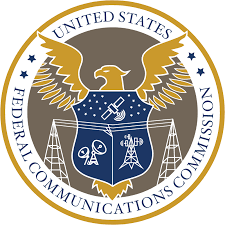
The farm bill may also soon play a key role in maintaining another key government program: the $14 billion Affordable Connectivity Program (ACP) currently overseen by the Federal Communications Commission (FCC).
Both Band Aid And Key Lifeline
Decorah, Iowa is moving forward on a long-percolating plan to expand the city’s core fiber ring to provide affordable broadband access to long-neglected residents and businesses.
While the project has been discussed for years, local officials tell ISLR the project gained renewed momentum during peak COVID, and is creeping closer to launch.
Contracts are still being finalized as the city hopes to spend somewhere around $12 to $15 million to deliver fiber to all 3,000 potential subscriber locations. The full project would take about three years to deliver fiber to all 7,740 city residents, with the first subscribers potentially coming online this fall.
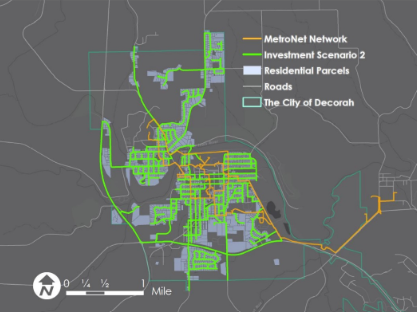
“Decorah has been in pursuit of fiber to the premises for the last 8 to 9 plus years and we finally have broken through some of our challenges on how to get to the finish line,” Chopper Albert, Decorah IT Director told ISLR.
According to Albert, Decorah’s recent progress is thanks in part to new City Manager Travis Goedken, who has long advocated for expanding the city’s existing fiber network to drive affordable fiber access citywide.
New City Management Team Pushes Forward
Since 2013 the city has owned an 11-mile core fiber network, dubbed the Decorah MetroNet. MetroNet was born out of frustration after a major flood in 2008 across much of Iowa resulted in prolonged communications network outages.
MetroNet (not to be confused with the Indiana-based ISP that goes by the same name) currently provides access to Luther College and 18 additional government buildings and anchor institutions.
For over 20 years, the city of Palo Alto, the "Birthplace of Silicon Valley,” has flirted with the idea of building a city-owned municipal fiber network. Now after years of debate, numerous studies, several false starts, and many unfulfilled RFPs, city officials say they’re finally moving forward with a city-owned fiber network they hope will transform affordable broadband connectivity citywide.
Palo Alto officials tell ILSR that the project will be spearheaded by the city-utility, and deployed in coordination with a major upgrade of the city’s electrical systems. Phase One of the city’s planned fiber deployment should begin later this year, delivering fiber access to around 20 percent of the city–or 6,500 homes and businesses.
Phase One will be funded entirely from the utility’s existing cash reserves. Profits from that deployment will then be used to expand affordable, multi-gigabit fiber access to all of the city’s 63,210 residents. Though no shortage of challenges remain.
A Long Time Coming
That Palo Alto residents have been clamoring for better, more affordable alternatives to regional telecom monopolies for 25 straight years speaks for itself. The high costs, slow speeds, and abysmal customer service of regional telecom giants AT&T and Comcast have long driven the public’s unflagging interest in better, cheaper connectivity options.
The establishment of a new broadband office in Mississippi heralds a new era in the state’s efforts to bring high quality broadband to all its residents, especially those living in the most rural parts of the state.
On the forefront of that effort is the Delta Electric Power Association, an electric cooperative currently building out fiber infrastructure in the Mississippi Delta region – a mostly rural part of the state with a majority Black population and where about a quarter of residents do not have access to broadband of any kind.
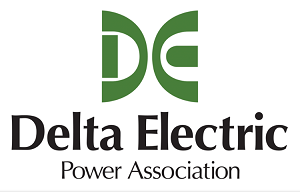
As in other states with sizable rural areas, electric cooperatives are playing a major role in building out high-speed Internet infrastructure.
In Mississippi, Delta Electric, has a service area that covers ten counties in the northwestern part of the state, providing electricity for 4,235 industrial, 3,144 commercial, and 21,174 residential member-owners.
Now, the cooperative has set its sights set on bringing high-speed Internet service to its members, left behind by the big national providers who do not consider the region profitable enough to invest in.
Electric Cooperative Starts With CARE(S)
It started in 2020, when the electric cooperative was awarded a $4.9 million Coronavirus Aid, Relief, and Economic Security (CARES) Act grant for a fiber pilot serving Carroll County with gig speed connections.
Five years ago, the Central Virginia Electric Cooperative (CVEC) announced the creation of the Firefly Broadband initiative, a subsidiary specifically built to leverage the co-op’s existing electrical assets to deliver affordable fiber to 13 underserved Virginia counties.
Half a decade later, the coop says it has successfully completed its $150 million expansion project, deployed 3,600 miles of new fiber, passed 40,000 total homes and businesses, and directly connected 20,000 state residents–many for the first time ever–in less than 52 months.
“Central Virginia Electric Cooperative partnered with Conexon to perform a feasibility study for a fiber build across their entire service territory – 13 counties and 3600 miles,” CVEC VP of Communications Melissa Gay told ILSR. “Once the target costs, offerings and take rates were determined, we chose to race to secure supplies and labor. Finding great partners has been a tremendous help to the success of our project.”
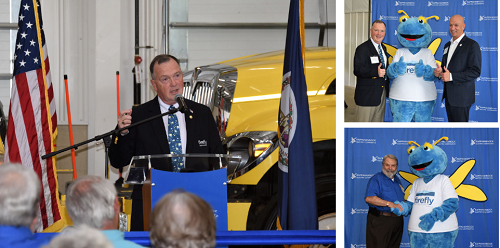
Buoyed by numerous grants including a $28 million combination loan and grant from the USDA's ReConnect Program, Firefly now provides local residents symmetrical 100 Mbps (megabits per second) fiber for $50 a month, and symmetrical 1 Gbps (gigabit per second) service for $80 a month. There are no contracts and no data caps.
About 90 percent of households connected had no broadband access previously, according to Bruce Maurhoff, Firefly’s senior vice president and chief operating officer.
As a young woman of the Nuxalk Nation, Mallory Hans is “clearing a path for future generations.”
A 2022 graduate of the British Columbia Institute of Technology, she’s one of about 50 people hailing from various Tribes and First Nations across North America in attendance for the latest Tribal Broadband Bootcamp, a three-day intensive learning experience focused on building and running Tribal Internet networks.
Held in different tribal regions several times a year since the initiative began in 2021, this bootcamp (the eighth in an ongoing series of hands-on seminars) is being hosted at the Akwesasne Mohawk Casino Resort on the Saint Regis Mohawk reservation along the New York/Canada border.
“So far so good,” Mallory said on Day Two of the bootcamp just as the attendees broke into small groups to go through a variety of demonstration stations set up by bootcamp instructors and Tribal employees who run Mohawk Networks, which provides fiber-to-the-home (FTTH) Internet, video, and voice services across the reservation in northern New York.
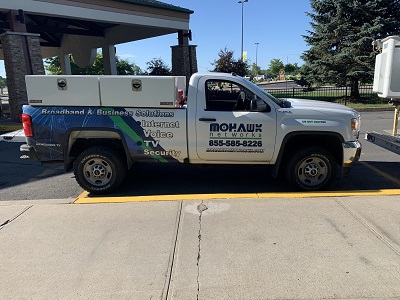
In continuing the driving impulse to demystify technologies and build capacity among cohorts in Tribal nations, Day Two was centered around fiber stations that included demonstrations of how network operation centers are run; one on fiber splicing; another showcasing equipment used to install fiber inside of households with representatives from Calix, and another station on the electronic equipment that measures the performance of fiber lines.
“I’m enjoying it, feeling more confident and finding out I’m capable,” said the 22 year-old, newly minted fiber technician.
Portland activists are renewing their calls to prioritize the construction of a municipally owned broadband network in the Oregon city of 635,000. With an historic infusion of federal subsidies and a looming shakeup of city politics, advocates for community-owned broadband say the time is right to finally revolutionize city telecom infrastructure with an eye on affordability.
“Ten years ago was a perfect time to embrace community broadband and nothing has changed,” Russell Senior, President of Personal Telco, a nonprofit wireless network, and Municipal Broadband PDX, a nonprofit advocating for publicly-owned fiber networks in Multnomah County, Oregon told ILSR.
“ISPs continue to exercise monopoly power and have their boot on the neck of subscribers,” he said. “The most practical and effective way to get out from under that boot, in light of persistent federal complicity, is local public ownership of the infrastructure that gives them that power.”

Portland has historically been at the very center of the debate over monopoly power and competitive broadband access, and city officials have been contemplating a publicly-owned broadband network for more than 20 years. It’s a concept other Oregon cities, like nearby Hillsboro, adopted years earlier.